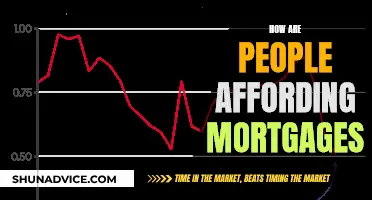
There are many factors to consider when determining how big a mortgage you can afford. The most important consideration is how much house you can afford. Lenders will often be inclined to loan you more money than you expect, but it's important to consider your current and future needs without feeling like all your money is going towards your mortgage. You can use a mortgage calculator to estimate a comfortable mortgage amount based on your current budget, but you should also consider your income, debts, and down payment. Improving your credit score and reducing your debt-to-income ratio will help you get a better mortgage rate. The more money you can put down upfront, the less you'll need to borrow and pay in interest. It's also important to keep in mind that there may be additional costs such as closing costs, taxes, and fees associated with the homebuying process.
| Characteristics | Values |
|---|---|
| Mortgage type | Repayment mortgage, Interest-only mortgage, Fixed-rate mortgage, Variable-rate mortgage |
| Factors considered by lenders | Income, Outgoings, Financial commitments (loans, credit cards, debts), Deposit amount, Property value |
| Affordability tools | Mortgage calculators, Affordability calculators |
| Lenders | Banks, Building societies, Mortgage lenders (e.g. New American Funding, Rocket Mortgage) |
| Application requirements | Proof of ID, Income verification, Monthly outgoings details (e.g. bank statements) |
| Typical length | 25 years (can range from 5 to 40 years) |
What You'll Learn

How much can I borrow?
The amount you can borrow for a mortgage depends on a variety of factors, including your income, outgoings, and any financial commitments such as outstanding loans, credit cards, or debts. The amount you can borrow will also depend on the lender, with some offering better rates for larger deposits or shorter fixed terms.
Lenders will typically require proof of ID, evidence of income, and details of monthly outgoings, such as bank statements, when you apply for a mortgage. They will use this information to calculate how much they are willing to lend. The more you are committed to spending each month, the less you can borrow, as lenders need to assess whether you could keep up with repayments if your circumstances change, for example, if there is an interest rate rise or your income changes.
Mortgage calculators can be used to get a rough idea of what you could borrow. These calculators take into account your income and monthly outgoings to estimate how much you can afford to borrow. They can also be used to estimate monthly repayments and how changes in interest rates could affect these.
The typical mortgage length in the UK is 25 years, but this can range from 5 to 40 years depending on the lender, your age, and what you can afford. It is important to remember that the longer the term, the less you may pay each month, but you will end up paying more in interest overall.
It is recommended that you get an Agreement in Principle (AiP) before applying for a mortgage to assess your eligibility.
The Intricacies of Mortgage Pricing and Their Determinants
You may want to see also

How much you'll need for a deposit
The amount of deposit you'll need for a mortgage depends on several factors. Generally, the bigger the deposit, the better the interest rate you're likely to be offered, and the lower your monthly repayments will be. Lenders will typically require a minimum deposit of 5% of the property's value, but it's recommended that you save more if possible.
The amount you can borrow for a mortgage is largely dependent on your income. Lenders will calculate how much they're willing to lend based on your income and monthly outgoings, so they may require proof of ID, income, and bank statements. The maximum amount you can usually borrow is capped at four-and-a-half times your annual income. It's important to consider your budget realistically and ensure that you can afford the monthly repayments, including interest, over the life of the mortgage.
Mortgage calculators can provide a rough estimate of how much you could borrow and what your monthly payments might be. These calculators take into account factors such as your income, monthly outgoings, and the interest rate on the loan. However, it's important to remember that these calculators only provide a rule-of-thumb estimate, and the actual amount you can borrow may vary depending on the lender and other factors.
When deciding on a deposit amount, it's crucial to strike a balance between borrowing enough to purchase your desired home and not taking on more debt than you can comfortably repay. Remember that your property will be used as security for the loan, and failure to keep up with repayments could result in repossession. Therefore, carefully consider your financial commitments and budget realistically to ensure you can afford the mortgage repayments over the long term.
Streamlining Digital Mortgages: B of A's Smart Strategy
You may want to see also

How to calculate monthly payments
When it comes to calculating monthly mortgage payments, there are several factors to consider and various online tools that can help. Firstly, it's important to understand the components that make up your monthly mortgage payment. The principal, or the amount you borrowed, is the loan itself, and the interest is the cost of borrowing that amount, which is calculated as a percentage of the principal. In addition to the principal and interest, your monthly mortgage payment may also include property taxes, homeowner's insurance, and, if applicable, mortgage insurance and escrow. Property taxes are levied by your city or town and are paid for as long as you own the property. Homeowner's insurance protects you financially from damage to your home and typically costs less than 1% of the home's price. Private mortgage insurance (PMI) is required if your loan amount is greater than 80% of the home's purchase price, and it is calculated based on your credit score and down payment. Escrow is an account that your mortgage lender may require, where you pay a portion of your annual property tax bill with each monthly payment.
To estimate your monthly mortgage payment, you can use online mortgage calculators. These tools often require information such as your income, monthly outgoings, and the purchase price of the property. They may also ask for details about your down payment or loan amount. By inputting this information, you can get a rough idea of your monthly payments. It's important to remember that these calculators provide a guideline, and the actual payments may vary based on your chosen lender and loan terms.
When considering your monthly mortgage payments, it's advisable to be conservative and cautious. Lenders will assess your income and outgoings to determine if you can keep up with repayments, even if your financial circumstances change. To manage your budget effectively, it's crucial to consider other expenses, such as energy bills, Council Tax, insurance, and food.
There are several strategies you can employ to manage your monthly mortgage payments. One option is to choose a longer-term loan, which will result in lower monthly payments, although you will ultimately pay more in interest over the life of the loan. Alternatively, you can make a larger down payment, reducing the size of the loan and, consequently, your monthly payments. Shopping around for lower interest rates from different lenders can also help lower your monthly payments. Additionally, you can explore the option of making biweekly payments, which involves paying half of the monthly payment every two weeks. This method can be particularly useful if you receive your paycheck biweekly, as it helps you develop a habit of allocating a portion of each paycheck towards your mortgage.
Net Yields and Mortgages: Understanding the Intricate Relationship
You may want to see also

How to compare mortgages
When it comes to comparing mortgages, there are several factors to consider. Firstly, it is essential to shop around for lenders and compare their rates. This can save you a significant amount of money. You can start by looking at sample rates on lenders' websites, but it is also a good idea to apply for mortgage preapproval from at least three lenders to get real numbers. Each lender will provide a loan estimate, which is a standardised form that lists key details about your loan, such as the interest rate and the APR.
When comparing these loan estimates, pay close attention to the fees charged by different lenders. These fees can add up quickly and impact the total cost of the mortgage. Ask each lender for a detailed breakdown of all fees and compare them to find the most favourable terms. Consider both the interest rates and fees, as a lower interest rate might be offset by high upfront costs. Understand that some fees are negotiable, so you can use this information to negotiate with lenders if necessary.
In addition to rates and fees, there are other factors to keep in mind. Online reviews and ratings of lenders can be very informative, indicating which lenders provide the best customer service and most competitive rates. When reviewing this information, look out for details about customer service, such as whether the lender responds to criticism and addresses concerns promptly.
Another factor to consider is the loan-to-value ratio, which represents how much of the property's total price is paid for by the mortgage. Typically, a higher loan-to-value ratio results in a higher interest rate because there is more risk for the lender. Therefore, increasing your deposit amount or buying a less expensive property can help you secure a better mortgage rate.
By carefully comparing multiple mortgage lenders and considering all the relevant factors, you can find the best deal and save money in the long run.
Getting a Mortgage: What Lenders Look For
You may want to see also

What to do if you can't keep up with repayments
A mortgage is a large loan, typically from a bank or building society, that lets you borrow money to buy a property or land. The loan is 'secured' against the value of your home until it's paid off. If you can't keep up with the repayments, the lender can repossess (take back) your home and sell it to clear the debt.
If you're having trouble paying your mortgage, it's important to act fast as the consequences can be serious. Here are some options to consider if you can't afford your mortgage payments:
- Contact your mortgage servicer or lender right away to discuss your options. They may be willing to offer temporary forbearance, which allows you to pause or reduce your payments for a certain period. You will need to repay the missed payments eventually, but there is usually no fee or penalty for forbearance, and you won't be charged additional interest during the forbearance period.
- Consider modifying your loan. This involves changing the terms of your loan to make it more affordable, such as extending the repayment term, reducing the interest rate, or in some cases, reducing the loan's balance.
- If you can't pay your mortgage due to temporary financial hardship, you may be able to take out a new mortgage with a lower monthly payment.
- Explore the option of a short sale, where the lender agrees to let you sell your home for less than you owe on the mortgage. This will appear as a negative entry on your credit report, but it may help you avoid foreclosure and the associated damage to your credit score.
- Get in touch with a local attorney. Foreclosure is a legal process, and having someone guide you through it can be beneficial.
Remember, it's important to be proactive and communicate openly with your lender or servicer to work out a relief plan. Additionally, consider seeking advice from a financial planner or credit counsellor to explore all your options and make informed decisions about your home financing.
Understanding Mortgage Products: COLI, BOLI Connections and Implications
You may want to see also
Frequently asked questions
Affordability depends on your current and future needs. A good rule of thumb is that your mortgage payments shouldn't exceed 28% of your pre-tax monthly income.
Lenders will often approve you for the maximum amount they believe you can afford. However, this amount may be too generous, so it's important to assess your financial situation and shop around for the best deal.
Get details and terms from several lenders or mortgage brokers, and use tools like a Mortgage Shopping Worksheet to compare loans. You can also use online lenders like Rocket Mortgage to get approved for a loan quickly.
Different mortgage terms can significantly affect your monthly payments and overall interest. For example, a 30-year fixed-rate loan will have lower monthly payments but higher overall interest compared to a 15-year fixed-rate mortgage.
A 20% down payment is ideal, but it's not always required. The amount of your down payment can determine the details of the loan you qualify for.







